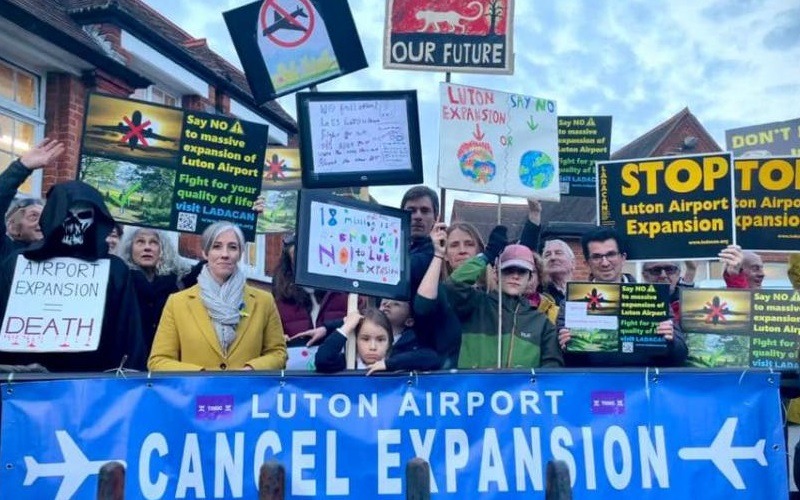Campaign group LADACAN has launched a legal challenge to the expansion of London Luton Airport, arguing that consent for the proposed development was granted unlawfully.
In a letter to Heidi Alexander, Secretary of State for Transport, signalling the start of the Judicial Review process, LADACAN says she ignored the recommendation of National Planning Inspectors to refuse development permission, and that the plans for the expansion failed to include adequate environmental assessments.
Detailed examination of the proposals took six months, and the Inspectors’ report concluded that the economic benefits of a new terminal aimed at doubling the Airport’s annual passenger numbers to 32 million did not outweigh the environmental harms.
Despite this, the government granted consent for the development in April 2025. LADACAN argues that this decision was not lawful. The group says that the plans fail to fully assess the likely direct and indirect effects that the development would have on climate change, and fail to set out what would be done to mitigate this.
It also argues that the plans are overly reliant on ‘aspirational’ technical developments in the government’s Jet Zero Strategy. Whilst hypothetically capable of offsetting the future impact of aviation expansion on the climate, the Climate Change Committee has cast doubt on whether they can actually be delivered.
In its letter to the Secretary of State, LADACAN calls on the government to accept that the decision was unlawful. The grounds of its claim include:
- The direct and indirect impacts of the development on climate change via greenhouse gases excluded emissions from inbound flights and emissions
associated with the production and delivery of fuel. - The development plans incorrectly rely on the ‘High Ambition’ scenario of the Jet Zero Strategy – a strategy which is subject to ongoing legal challenge.
- It was wrongfully assumed that compliance with Jet Zero meant that the climate impact of the development had been addressed, since the Strategy is reliant on the planning process and assessments by planning decision makers.
- There was an error in law in concluding that the government’s duty under the Climate Change Act 2008 to adopt policies and procedures to help reach net zero was a ‘pollution control regime’.
- There is a lack of consistency between the Luton decision and the approach taken in the Gatwick Airport expansion assessment, which has been delayed while improvements are made to the plans to address environmental concerns.
Andrew Lambourne, Chair of LADACAN, said: “Everyone can see the worsening effects of climate change, and it’s obvious that storms, floods and wildfires lead to huge costs. These costs damage the UK economy, so the government should be taxing carbon-intensive activities such as frequent flying, rather than encouraging it. Sustainability, climate costs and quality of life must be properly weighed when assessing development proposals.”
Leigh Day partner Ricardo Gama, who represents LADACAN, said: “Our client’s position is that the Secretary of State should not have overruled the recommendation of the expert National Planning Inspectors by granting expansion of Luton Airport, in light of climate change and other harmful impacts of the development. They believe that growth at the expense of everything else, including the government’s net zero obligations, has longer term costs which outweigh any benefits. We hope that the Secretary of State will reconsider her decision in light of our letter.”
LADACAN is crowdfunding its legal case via CrowdJustice at this link: https://www.crowdjustice.com/case/stop-luton-airport-expansion
Notes for Editors
- LADACAN, the Luton And District Association for the Control of Aircraft Noise, is a longstanding community group representing the concerns of its members in Bedfordshire, Hertfordshire, Buckinghamshire and Cambridgeshire who are increasingly concerned about the ever-increasing noise and environmental impacts of Luton Airport.
- Luton Airport was permitted passenger capacity from 9 to 18 million passengers per annum in 2014, in a project intended to take until 2028, with noise mitigated by fleet modernisation. Incentivised by its owner Luton Rising however, the airport operator added new slots faster than modernised aircraft, and in doing so broke its noise control planning conditions for three years in a row, reaching capacity in 2019. Since then it has continued to seek growth, with the latest plans from Luton Rising set to nearly double passenger numbers to 32 million, while increasing noise and traffic levels to a point which Planning Inspectors rejected as outweighing economic benefits.



